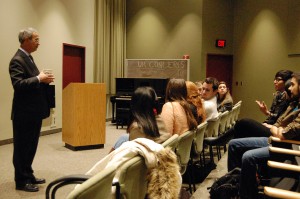University President Joel Seligman hosted a Town Hall in the Gowen Room of Wilson Commons on Monday, Feb. 18.
Before an audience of 30 undergraduate students and a smattering of graduate students, Seligman began the meeting with a brief overview, discussing College Town as well as campus diversity.
Seligman first touched on the work being done on the College Town project, describing what may be included in the finished product. With 1,600 new parking spaces to be provided, the development will cover 15 acres at the corner of Mt. Hope and Elmwood Avenues.
The development will include housing units in addition to the housing planned near Brook’s Landing.
Despite the increased housing units, Seligman emphasized that the student body population would not be growing significantly as a result.
College Town is due for summer construction, with the ground breaking in May.
One student asked Seligman about the decline of the on-campus social scene and the safety risks involved as more students go off-campus to find parties. The student claimed that in a discussion with an officer from the Rochester Police Department, they had said that they were nervous with the increased numbers of UR students entering the 19th Ward.
Seligman made it clear that safety is a fundamental concern of the University. Our campus exists in a bubble and the administration works hard to provide an adequate on campus social scene, he said. He added that he believed the fraternities on campus would return in strength over time.
Seligman continued by discussing the current Fisher v. University of Texas court case. The case involves a white Texan woman who was denied admission to the University of Texas.
She decided to file suit, claiming that the university had denied her admission on the basis of race with the belief that the policies of affirmative action lead to an unfair admissions process.
While the outcome could affect the college admission process, Seligman also described the intangible effects.
“While it affects universities and colleges, it’s also about what kind of country we are,” he said. “I worry about changing our nature, if its the wrong decision.”
Whatever the outcome, Seligman assured the audience that UR would continue upholding its commitment to diversity.
Later in the meeting a student from the Douglass Leadership House (DLH) asked about any policies in place for faculty diversity. Seligman discussed the difficulties inherent with tenured professors and the effort to diversify. He continued to say that while quotas aren’t allowed, “hiring practices have been coordinated to encourage diversification of the faculty.”
A student, worried about the recent turnover of the previous Rochester Philharmonic Orchestra conductor Arild Remmeriet, inquired about Seligman’s dedication to the organization.
After briefly delineating the history of the RPO, Seligman stated that UR wouldn’t make a financial guarantee to the orchestra. While he will do as much as he can to encourage its survival, UR employs over 22,000 employees and acts as the largest employer in the area, a commitment that “comes first.”
A freshman took the opportunity to ask Seligman about the increases in tuition, questioning whether costs would rise and what has caused the hikes in the past.
He responded first that tuition had to be adjusted initially due to inflation and that the university was committed to providing the highest quality of education. Part of providing that sort of quality comes from attracting and maintaining the best faculty possible. In some instances, that involves negotiating with professors who are being courted by both UR and other institutions. In addition to maintaining an excellent staff, UR works to provide advanced labs, libraries, and other functional buildings, however these costs are increasing at a slower rate than previously.
In a moment of nostalgia, Seligman described his first year at college in California during the 1960s: his total expenses for the year came out to $300. Four years later when entering law school, costs had risen to $3,000 a year. He said that the educational environment has changed entirely, and their costs are consistent with the highest quality of education that can be provided.
The meeting continued with a range of topics, from a discussion about UR’s relationship with the Rochester City School District to how Seligman would present the institution if he were a tour guide for prospective students.
In a final, poignant moment, Seligman was asked what he would like to see grow organically from the student body what could be worked towards. He responded by describing the changing student body. As the population of international students increases, Seligman encouraged students to focus on inclusiveness to become more welcoming as an organization. He’s hopeful that in doing so, students will learn about the depth of the cultures represented at UR.
Smith is a member of the class of 2014.




